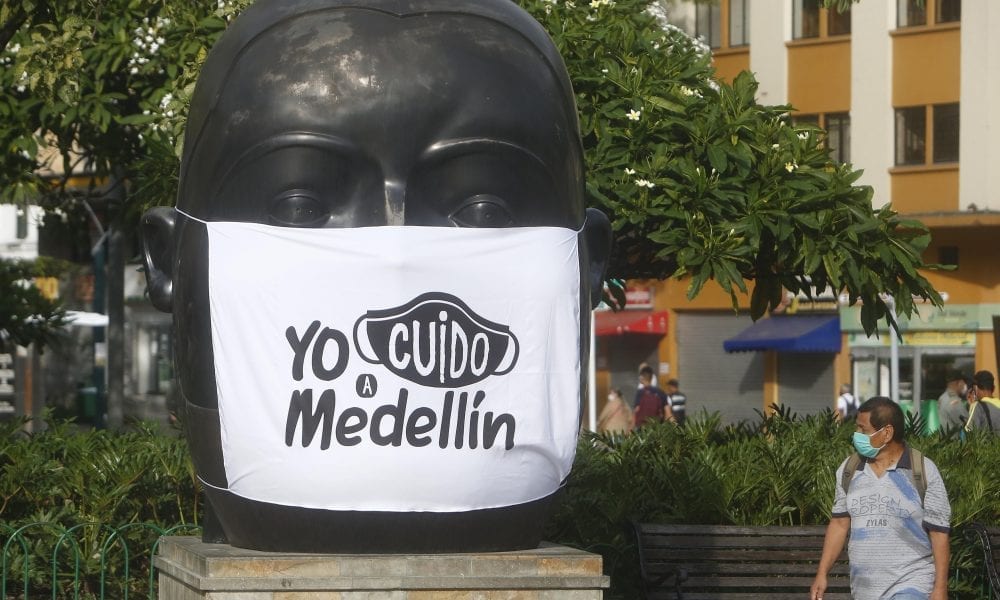RIO DE JANEIRO, BRAZIL – The Colombian city of Medellin, which a year ago was a model in the management of covid-19, is living dramatic days due to the increase of infections and deaths, a situation that puts doctors in the painful task of choosing to whom they assign each free bed in the hospitals.

The situation in Medellin and the department of Antioquia (northwest), of which it is the capital, has taken on dramatic overtones due to the collapse of hospital services, which is reflected in the lines of ambulances with patients waiting to be assigned a bed in Intensive Care Units (ICU).
This scenario contrasts with that of the beginning of the pandemic, a year ago, when the city, second in importance in Colombia, was put as a model in the management of the health emergency thanks to its commitment to technology and Big Data to contain the spread of the virus through an “intelligent fence” of each positive case, a strategy that worked for a few months.
In Medellín, 250,036 positive cases have been confirmed, of which 13,330 remain active, 4,772 people have died, and ICU occupancy both in the city and in the department of Antioquia already exceeds 98%, a situation that authorities attribute mainly to the relaxation of self-care measures by people and new variants of the coronavirus.
In the last few days, Medellín has registered up to 80 deaths per day, and Antioquia had a record 146 deaths on Monday.
“ETHICAL TRIAGE” IN THE ICUS
The situation reached the point that last Sunday, the governor in charge of Antioquia, Luis Fernando Suarez, announced the “ethical triage” to decide who is assigned to an ICU, a dilemma for the medical staff.
The governor explained that the teams responsible for the hospital units must “analyze” the medical conditions of each patient: “the age, the state of comorbidities, the pathology and, in some way – it is hard to say it – define who will have access to an intensive care bed and who will not.”
Given the collapse, which has more than ten hospitals on maximum alert, the mayor of Medellin, Daniel Quintero, revealed that the medical staff, already exhausted by the long hours, has had to attend to patients in critical condition in “surgery centers or in the operating rooms to intubate them while an ICU bed is made available.”
Despite the extreme situation in the city, which also receives patients from other municipalities of Antioquia, Quintero assured that “we have not had to disconnect anyone yet.”
ALARM OF MEDICAL ASSOCIATIONS
Another alarm signal was given on Wednesday by ten health sector organizations which, in an open letter to the public, insisted on the need to declare a “strict quarantine for life for two weeks” since partial confinements and other measures have been insufficient to contain the pandemic.
The letter, whose signatories are headed by the Academy of Medicine of Medellin, warns of the seriousness of the situation “because of the confirmation in Antioquia of new strains of SARS-CoV-2 (British and Brazilian variant) with a higher degree of transmission, the generalized collapse of health services, high rates of infected, ICU bed occupancy and deaths.”
“We warn about the need for humanitarian aid to the poorest and most vulnerable populations, with the support of all public sectors and private enterprise,” the medical associations requested.
The authorities of Antioquia warn that the health system will remain “at the limit” for two more weeks and are concerned that the transfer of patients to other regions has become increasingly difficult because, in cities such as Bogota, which had been giving a respite with its support, cases also began to increase.
COLOMBIA GOES THROUGH THE THIRD WAVE
The crisis in Medellin and Antioquia is a reflection of the situation throughout the country, hard-hit for three weeks by the third wave of the pandemic, which forced Bogota, Barranquilla, Cali, and other cities to reintroduce daily confinements and night curfews to reduce the mobility of people and try to mitigate the spread of the virus.
Colombia has so far accumulated 2,684,101 infected and 69,177 deaths. Still, the concern is great throughout the country because ICUs are bursting at the seams in many cities, and deaths reached record levels this week, with 420 deaths on Monday and 429 on Tuesday.
As if that were not enough, mass vaccination, which began to take hold in February and March, has had problems this month because the country has not received the expected doses, mainly from the Chinese laboratory Sinovac, whose deliveries have been delayed.
As of Tuesday, Colombia had applied 3,977,780 vaccines, of which 1,231,864 are second doses, with sera from Pfizer, Sinovac, and AstraZeneca laboratories.

